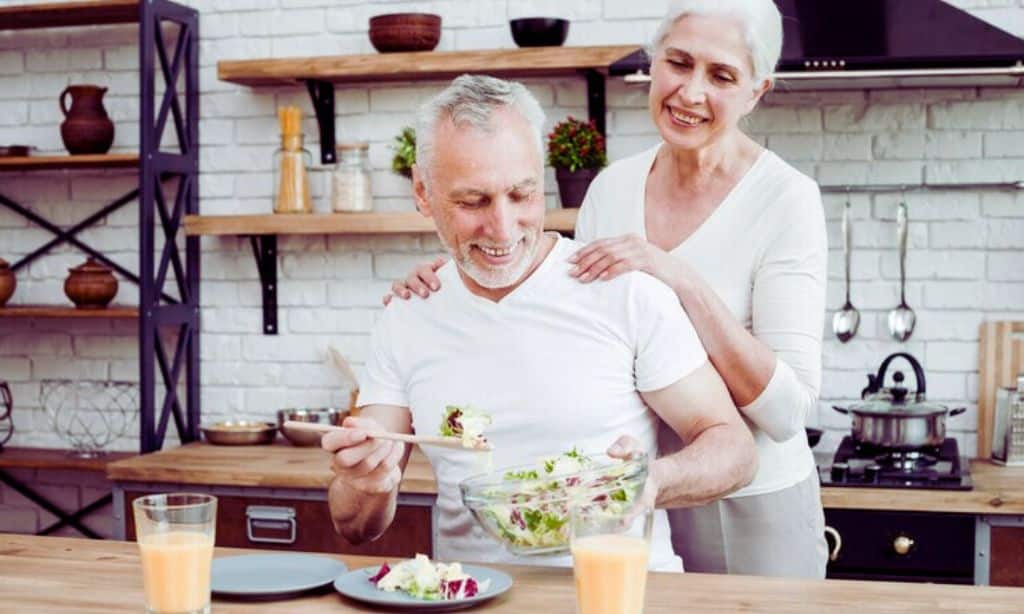How can we ensure that our elderly loved ones have the greatest possible lives in their later years? As people age, their quality of life and freedom frequently deteriorate owing to health difficulties, loss of mobility, financial restraints, loneliness, and other challenges. Fortunately, there are numerous effective approaches to improve senior quality of life. This article will look at practical, holistic approaches to increasing older well-being in the physical, mental, social, and spiritual domains. Continue reading to learn practical strategies for increasing aging folks’ comfort, dignity, and joy.
Content Highlights
- Encourage regular mild exercise to preserve both physical and mental fitness.
- Provide assistive equipment that allow seniors to maintain independence.
- Proactively implement home modifications to eliminate safety risks.
- Encourage community connections through family visits, friend gatherings, and group activities.
- Prioritize the accessibility and consumption of healthful, balanced meals.
- Treat age-related ailments quickly for best longevity.
- Enhance cognitive health by learning new skills and developing memory strategies.
- Encourage regular religious attendance and spiritual pursuits, as preferred.
- Encourage remembrance, legacy planning and heritage preservation.
- Monitor for deteriorating capacity to survive independently and plan for increased care.
Ways to Enhance Physical Quality of Life

As the body matures, physical health and mobility become more important for quality of life. Simple habits and lifestyle modifications can help the elderly maintain or increase their energy.
Advocate for Mild Exercise
Regular physical activity benefits the body and mind in the senior population. However, the intensity and duration should be adjusted to match individual fitness levels. Walking, swimming, tai chi, and chair yoga are all brief, mild workouts that engage muscles, joints, balance, and coordination while decreasing the risk of a variety of ailments.
Deliver Assistive Technology
Canes, walkers, shower seats, grab bars, mobile scooters, hearing aids, magnifying glasses, and other helpful devices allow the elderly to securely maintain their independence while performing daily duties. Consult doctors and occupational therapists to determine which goods will be most beneficial.
Place Home Safety First
Making house changes significantly reduces risks to senior residents. Install enough lighting, stair railings on both sides, easy-to-reach shelving, raised toilet seats, lever-style door and faucet handles, shower chairs, skid-free rugs, and electronic alarm systems if you live alone. A home safety evaluation identifies threats specific to the living environment.
Facilitate Healthcare Access
Helping older persons attend regular doctor’s appointments, physical therapy, dental checkups, and other vital healthcare prevents diseases that could jeopardize their quality of life. Offering transportation help or using offered medical transportation brings elders reach their appointments. Ensuring that medications are correctly administered prevents deterioration or consequences from chronic conditions.
Provide Saturated Meals
The welfare of aging populations is enhanced by maintaining a diet rich in nutrients and well-balanced. Lean meats, fish, whole grains, beans, veggies, and low-fat dairy are examples of healthy eating. Whether through meal delivery services, home cooking, or community activities, assist elders in having daily access to, purchase of, preparation of, and enjoyment of fresh, delectable foods.
Strategies to Enhance Mental Well-Being
Aging is frequently accompanied by mood disorders and cognitive deterioration. However, seniors’ mental health can be significantly improved by making intentional changes to their environment and way of life.
Maintain Mental Activity
Constant mental stimulation enhances happiness and cognitive performance in a profound way. Seniors should take advantage of fresh educational opportunities such as reading books, going to lectures, picking up a foreign language, engaging in strategy games, or picking up a hobby. Long-lasting sharpness is promoted by purposeful brain-exercising activities.
Handle Any Mental Illness
Ensuring accurate diagnosis and treatment of psychological disorders such as depression, anxiety, dementia, or other problems affects older adults. Seeking advice from medical and mental health professionals ensures that treatment methods are suitable and may include counseling, medication, brain training activities, meditation, or support groups.
Offer Reminiscence Counseling
Happily remembering past experiences often improves mood and increases cohesiveness and self-worth. Memorize on your own, with family, or in groups by telling heartfelt tales, browsing through old pictures, watching movies, listening to your favorite music, or going back to significant places.
Acquire and Apply Memory Techniques
Seniors with mild memory loss might benefit from a variety of cognitive strategies that increase their ability to quickly and accurately recall critical information, such as names, dates, times, locations, and task lists. Visual imagery, verbal association, chunking, mnemonic devices, repetition, relaxing, categorization, and connecting new information to previously learned concepts are all helpful strategies. Occupational therapists can teach specific techniques.
Strategies for Raising Social Quality of Life
People are inherently drawn to one another and a sense of community. Fostering social ties protects against depressing loneliness and enhances everyday experience for seniors who are experiencing limited mobility or the death of a loved one.
Plan Visits with Family
A significant factor in the contentment and sense of purpose of older people is regular engagement with their offspring, grandkids, nieces, nephews, and other family members. Families should plan frequent face-to-face get-togethers, phone conversations, text messages, video chats, tailored care packages, and cards that express love and unity.
Plan Trips with Friends
Meaningful camaraderie emerges from persistent friend groups. Help senior citizens organize safe events, get-togethers, activities, or trips with peers their own age to foster enjoyable and lasting interactions. Help friends who have mobility challenges by offering to drive them.
Include Pets
Without requiring a lot of human connection, having an animal companion can provide a great deal of emotional comfort and inspiration. Seniors who are able to do so should think about getting a pet that suits their needs and way of life, such as a dog, cat, bird, or fish. Pets encourage their owners to exercise and show them tender affection.
Participate in Community Groups
Pursuing common interests and goals helps one resist the urge to isolate oneself. Make connections between retiring or widowed seniors and local groups that get together for shared interests, such as book clubs, hobby gatherings, volunteer organizations, senior center activities, church congregations, or other groups. Find out the social situations each senior may prefer.
Make Use of Technology
When physical limitations prevent seniors from attending social events in person, smart devices and applications let them remain connected to their social network. Make sure elderly family members continue to be adept at using smartphones, social media, video chat, and picture sharing to take part in online discussions and activities.
Methods for Increasing Spiritual Life Quality
Seeking purpose, comfort, and meaningful connection in one’s older years is a crucial part of strengthening one’s emotional intelligence and mental acuity. The following routines enhance spiritual well-being.
Encourage Participation in Religion
If one is spiritually oriented, engaging in social interaction and serving in a church, synagogue, mosque, or temple community is a major source of heavenly connection. Provide transportation help or rides to programs and events so that devoted elders can attend on a regular basis.
Promote Life Assessment
Elders gain a greater understanding of their own history when they revisit their tale by thinking back on key moments, successes, setbacks, lessons learned, and connections from childhood to the present. Writing a memoir, keeping records, and journaling bring the project to a clear focus. Talking about reflections with someone you love fosters priceless conversations.
Encourage the creation of legacy
Seniors can ensure their life lessons are remembered by creating memory albums, family trees, heirlooms, distinctive recipes, and ethical wills. Help them preserve their experiences by starting legacy initiatives, gathering oral histories, or using organizational methods. The procedure preserves legacy while arousing nostalgia.
Takeaway
The physical, mental, social, and spiritual domains all require the use of holistic techniques in order to improve the quality of life for the elderly. A thoughtful implementation of actions that respect senior dignity can greatly increase everyday pleasure. These actions might range from promoting physical activity, community involvement, cognitive training, and memory building to offering wholesome meals, mental health care, life evaluations, and legacy building. Our aging loved ones might enjoy a richer feeling of purpose, comfort, and belonging as they age with the regular care support of friends, family, and community activities.
Frequently Asked Questions
These are some often asked questions concerning improving older folks’ quality of life:
1. How can I make the biggest difference in the lives of my elderly parents or grandparents?
The most effective way to demonstrate unconditional love is to spend regular quality time with someone in person, engaging in meaningful activities, conversation, and active listening. Put establishing a rapport ahead of finishing duties.
2. Which Modifications to Lifestyle Do Senior Vitality and Happiness Increase the Most Frequently?
Elder wellness is enhanced by a variety of factors, including moderate physical activity, mentally stimulating hobbies, strong social ties, meaningful community service, appropriate medical care, a rewarding spiritual life, nutrient-dense whole meals, and therapeutic memory recall.
3. How Can I Assist Elderly People Who Are Homebound in Strengthening Their Social Networks?
If a senior is unable to leave their house, foster social ties by arranging regular video chats for virtual “visits” with family and friends, sending care packages, and helping them become proficient with the phone and the internet so they may take part in continuous conversations through technology.
4. Which Free or Cheap Resources Enhance Senior Enrichment?
Senior well-being can be enhanced by a variety of low-cost or free options, such as books from the library, community center activities, talks on adult education, online aerobics videos, volunteering, joining a faith community, or taking in a pet from a shelter.
5. When Should I Think About Getting More Help for Senior Living?
More extensive daily assistance provided by senior communities may be required when increasing age-related mobility loss, health problems, or cognitive decline impair independent living safety and quality of life, even with assistive technology and home care services. To decide what to do next, speak with reliable specialists.




















